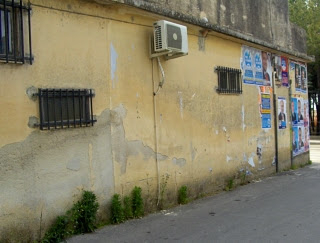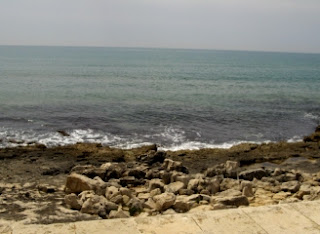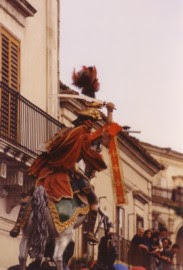Both
Ellee and
James have been focussing on care of the elderly, and
jmb recently wrote a moving post about Alzheimer's disease. These are subjects close to my heart as you will see, and, as Sicily does come into the story, I thought that today I would tell you what I was faced with when my mother became desperately ill. I do not think that one would encounter such an attitude from a medical professional here and, with the proviso of course that I can only comment on what I have seen or discussed with friends, families do still seem ready to take responsibility for their own elderly folk in Italy. There are many reasons for this, the most important being that it is still a very family-orientated society, but other factors are that fewer women go out to work here than in the UK and so are able to take on the caring and houses here do tend to be more spacious. The
casa di cura [care home ] is regarded as the last resort. I have been looking at some figures
here. But Italy has an ageing population so it is difficult to predict what the situation will be in a few years' time. The following, which I wrote whilst still in Britain, is the story of a terrible night and the run-up to it:
Mum
The nightmare began the night I got back from the first Italian exchange to Sicily, just before Easter 1993: Mum had come to stay down here for the fortnight in order to look after the dog and the house. I’d been in regular phone contact with her and she seemed fine, even looking up an obscure quote for me at one point. Anyway, that night she burnt some food and it struck me that normally she’d have been quite upset about it but she just didn’t seem bothered. The next day there were other things - little things- that seemed strange to me, too. They were so trivial that only I would have noticed but I was worried enough to ask my neighbours if they’d noticed any change in her behaviour; they all said no. It went on like this for a few days.
Mum was here on the night of 23rd April and she suddenly asked me why all the lights had gone out. It took me a minute to realise that there was something terribly wrong but when I did I immediately dialled 999 and then called Katie [my neighbour who is a nurse]. Mum was talking incoherently and calling for Dad. She said, "He’s only downstairs in the shop." [My Dad had been dead for twenty years and the shop he had was sold in 1959.] The ambulance took us straight to the Heath [Cardiff's main hospital] and they said they thought it was a TIA or mini-stroke. They stabilised her and I left at around 6am. At that time the emergency admissions entrance was just in front of the maternity unit, and, as I left, a woman obviously about to give birth arrived. I remember thinking, "life and death".
They only kept Mum in a couple of days. They confirmed the TIA diagnosis and when I asked the registrar if it was likely to happen again, he said it was unlikely provided she took an aspirin every day. I believed him because I wanted to.
Mum went back home and seemed OK at first. One Friday I got there from work and thought her eyes looked a bit strange. I had an appointment to see her GP , up the road, as I wanted to ask him some questions. When I told him my concerns, he drove straight down to Mum's with me and examined her. He couldn’t find any abnormalities.
I began to keep a diary - it was just instinct. I had a feeling I would need to go through all these incidents with someone in authority one day. Things were getting more and more bizarre, you see [and dangerous; one day I arrived at Mum's to find no sign of her but three badly burnt saucepans on the hob].
On the morning of 22nd May, a Saturday, I got there, let myself in and there was, again, no sign of Mum. [She knew I was coming.] No one had seen her leave the building and she hadn’t left me a note. This was so unlike her - she knew I would worry. I spent a frantic couple of hours phoning round: I called Katie , to check she hadn’t turned up here; called friends; considered calling the hospitals; I was afraid to go and look for her in case she turned up or in case there had been an accident and someone called her home. [This was not the era of mobile phones.] Besides, I didn’t know where to start. Mum eventually turned up, calm as anything, saying she’d gone up the road to buy a bottle of gin for me. I went bezerk at her.
I was so ignorant of the effects of stroke at the time. I knew about partial paralysis and dysphasia but I knew nothing about stroke-related dementia. I just couldn’t understand what was happening.
Well, I was trying to do my job and keep checking on Mum. There were so many strange things happening with her ; it was like everything I’d ever read about Alzheimer’s except for one thing - this was all so quick.
One day she came down here and left the front door open. I had a go at her, telling her that the dog would get out. She said, "No, he can’t" and I just couldn’t make her see that he could get through that door! Then there was some sort of incident in the corner shop ; she accused them of shortchanging her and came back with a load of figures written down which were meaningless.
Then she started arriving here at odd times in taxis [which she didn’t have the money to pay for]. I’d pay them and try to reason with her; I didn’t realise that you can’t reason with someone suffering from a kind of dementia.
One day we were in Safeway’s and she put five poussins in her trolley! [Neither of us had a freezer at the time.] I just couldn’t reason with her and I got exasperated and shouted at her. Everyone was looking. Why didn’t I just pay for them?
By now I was calling Mum's doctor regularly. I kept telling him I knew there was something wrong. To be fair to him, he’d always respond to my requests that he go and see Mum; he’d ask her some stupid questions, like who was the prime minister, and declare that she was OK. It wasn’t his fault - he just wasn’t catching her at her "odd" moments. I’d also got in touch with the
Stroke Association and the
South East Wales Alzheimer’s Careline; both were helpful and the latter were wonderful. They took what I was telling them very seriously; one of their medical staff went to see Mum and was as worried by the speed of the deterioration as I was. I knew there was a memory clinic at Cardiff Royal Infirmary and I’d asked her doctor to refer Mum, which he agreed to do, but the Careline people bypassed the usual procedure and got us an emergency appointment, for 9th June.
Now we come to the incident of the ring, the sapphire and diamond one that I always wear. I was here doing schoolwork on 3rd June [it was half -term] and thinking , I admit, how lovely it was to have a day’s peace when my friend and neighbour Martha rang and said , "Your mother’s just arrived here in a taxi." I admit my first reaction was one of anger - "Shit, can’t I have a day without this?" , then I went up to Martha’s and paid the taxi off. Mum was sitting there looking flushed and excited. Then she presented me with the ring: "I want you to have something to remember me by, darling." It was heartbreaking. She’d spent her whole pension on it - Mum, who had always been so careful! [I’d discovered,by the way, that she hadn’t been paying her rent in the previous weeks - out of character again.] Anyway, she was so pleased she’d got me this ring; apparently she’d got the taxi from home, not from town, and made the driver wait outside Samuel’s while she got it! So I thanked her and hugged her, put it on and told her I would always wear it, which I do. Then Mum came up here to see the dog - it was the last time she set foot in this house - and said she was off to meet her friend Margaret. [I later found out that Mum didn’t turn up.]
I think that the taxi rides - which were always to me - were bizarre cries for help. I also think that she was feeling too physically ill to walk very far, but she wouldn’t admit it.
That weekend she seemed calmer but on the Monday she went in to M&S with Margaret and bought herself a pretty dress on the spur of the moment. [She still hadn’t paid any rent and I could not reason with her.] Did she know she was dying and decide she was bloody well having things? Did she always secretly want to be extravagant like Dad? Or was it all just part of this seemingly manic phase? I don’t know.
On the evening of Tuesday 8th June I went to the flat: Mum was wearing the pretty dress ; I can see her now, so pleased with herself in it! I was trying to sort out the rent book, about which she was totally unconcerned. I left her at about 20.00. I was worried but we had the memory clinic appointment the next morning [I’d arranged time off to go with her] and I kept telling myself, "Someone will realise tomorrow; someone will help us."
At midnight the phone went. It was Mum, saying that she had suddenly become a rich woman and I was to come to the flat immediately. I tried to calm her, saying that it was midnight, we had an appointment in the morning, etc., but she became very demanding. [Now Mum had never been demanding; if anything, she was much too gentle, so this really did frighten me.] I called Martha and, kind lady that she is, she drove me to Mum's.
What happened next is imprinted upon my memory, but if it wasn’t I have documents to refer to for I wrote it all down later in a formal complaint.
The sight that greeted us when we got to Mum's was distressing beyond belief: For the first time in twenty years, I was actually glad that Dad was dead; I wouldn’t have wanted him to see this [or any of what happened in the ensuing weeks and months]: Mum was flushed and kept dialling and redialling my number. I was saying, "But I’m here, Mum." She kept saying, "But I’m rich and I’ve got to tell Pat - why doesn’t she answer?" - "Because I’m here, Mum"... I went out to the hall phone and dialled 999. I couldn’t think what else to do.At one point Mum did drop the phone for long enough to go and knock up the warden: "I’m rich; I’m rich and I’ve got to tell you!" [Funny that it all related to money, isn’t it?] I almost had to physically restrain her from waking up other neighbours. In Mum’s hand was one of those stupid "You may already have won" letters; to this day, I think there is a campaign to be fought in making companies more careful about where they send these. [The next morning I found another lot of senseless pencilled figures in the kitchen.] Then the dialling and redialling began again. [Have you ever had that "This can’t be happening" sensation?]
The ambulancemen came: They took one look at Mum and said that they thought it would be better to call out the GP, as the GP could get her admitted straight to the right sort of ward. [I think they thought that she was a case for the psychiatric hospital and that they were trying to save us from having to go through casualty.] The ambulancemen called the surgery locum service on their radio.
Between 01.30-02.00 a doctor arrived. He was obviously not pleased to have been called out! Before he entered the flat, I tried to explain to him what had been happening but he physically pushed me aside. I did say that my mother had been acting strangely for a few weeks but that what was happening now was utterly incomprehensible; I said that I thought she needed to go to hospital to be thoroughly checked over. He said, " She can only go to hospital if it’s an emergency". I said it was an emergency! He entered the room, looked at Mum, and said, in front of her [she was still dialling], "Of course, all you can do with these Alzheimer’s people is give them a tranquilising shot." [Now, whatever was in Mum’s confused mind at that time, she knew what Alzheimer’s was; how could he say that in front of her? - He hadn’t even bothered to examine her.] I couldn’t believe that this was happening on top of everything else: Here was my mother, "going mad" as it seemed, before my eyes, and this guy wanted to give her a valium?! [Looking back, it would have made more sense if he’d offered it to me!]
Anyway, I managed to say that I didn’t think that that would be sufficient and that I didn’t think that a non-medical person could handle the situation overnight. To this, he said, "Why haven’t you told your GP?" [!!!!] Then, because I was refusing to let him administer the valium, he said, "You called a doctor, didn’t you?" I replied, "Yes, and god help me, I got you!" [Mum was still dialling and dialling, saying "I’ve got to tell Pat."] I was at the end of my tether by now, so I wrenched the phone from Mum and redialled 999. The ambulance controller said Mum couldn’t go to hospital without the locum’s permission. So I then decided I’d scream at the doctor till he gave in , which he did. I put him onto the controller and he said, "Oh, you know what she’s like - shouting and screaming." I said, "I’m shouting and screaming to get you to do something!" The locum then wrote the casualty referral and left, passing a remark about me to Martha on the way. Mum started dialling again.
I opened the casualty referral; it gave a few cursory details about Mum - he never did examine her - and it also said "situation combined with the daughter shouting and screaming." This could have prejudiced casualty’s willingness to communicate with me, but did not.
The same ambulancemen came back; they were very kind. They sent me out of the room so that they could get the phone off Mum. It was now so distressing that they advised me not to get into the ambulance; Martha and I followed in her car.
Once we got to CRI and, from there, the Heath, the attitude of the medical staff was completely different: they realised that this was extremely serious and were kind with me. At the Heath they admitted Mum to an acute ward straightaway. They said that they didn’t know what it was, but they felt that it was something physical, not mental. The receiving doctor at the Heath was on the team that looked after Mum, and that helped a lot during the weeks to come.
I talked to a nursing tutor friend the next day, and she said that there was nothing else I could have done that night. When I spoke to the Careline people, they said that it is very common, in cases where the elderly, possibly mentally ill are involved, for call-out doctors to be dismissive. So I thought, that had been me that night, and I’d been prepared to fight for Mum. What if it had been some old dear who wouldn’t have stood up to the doctor? What would have happened then? So I made my mind up to have a battle. I lost it, but I think I managed to highlight some issues and hopefully make some people more careful in their dealings in such cases. I have to say that the medical care that Mum received once admitted to hospital was superb. But no one should have to go through what Mum and I did on the night of 8th - 9th June 1993.
Three months later Mum died in my arms. Not until the post-mortem was it established that she had suffered a massive stroke that night in an area of the brain that did not show up in any scan available at the time.
And even fourteen years later and many miles away, on the island of Sicily, sometimes when there is a dawn Scirocco and I cannot sleep, I go over and over the events of that night in my mind...














































































